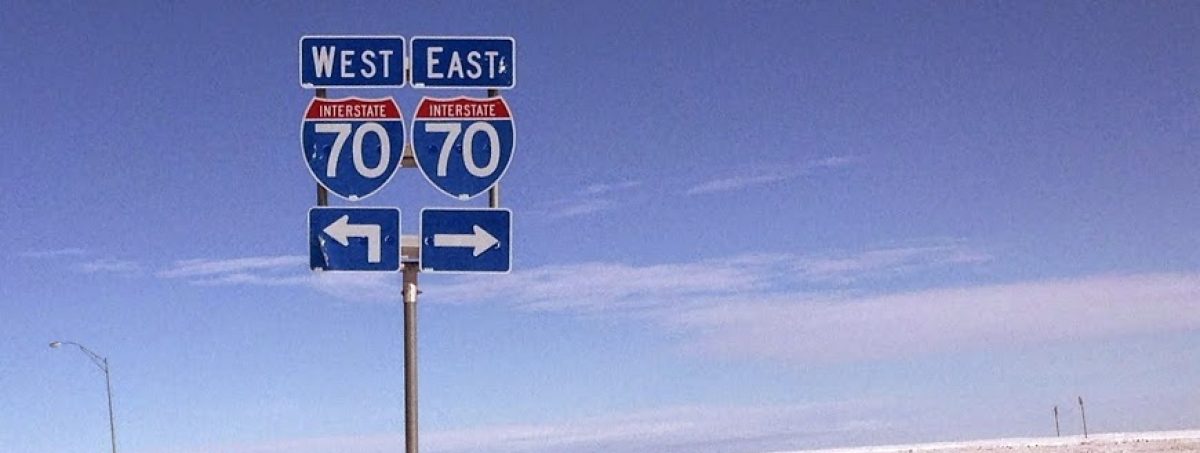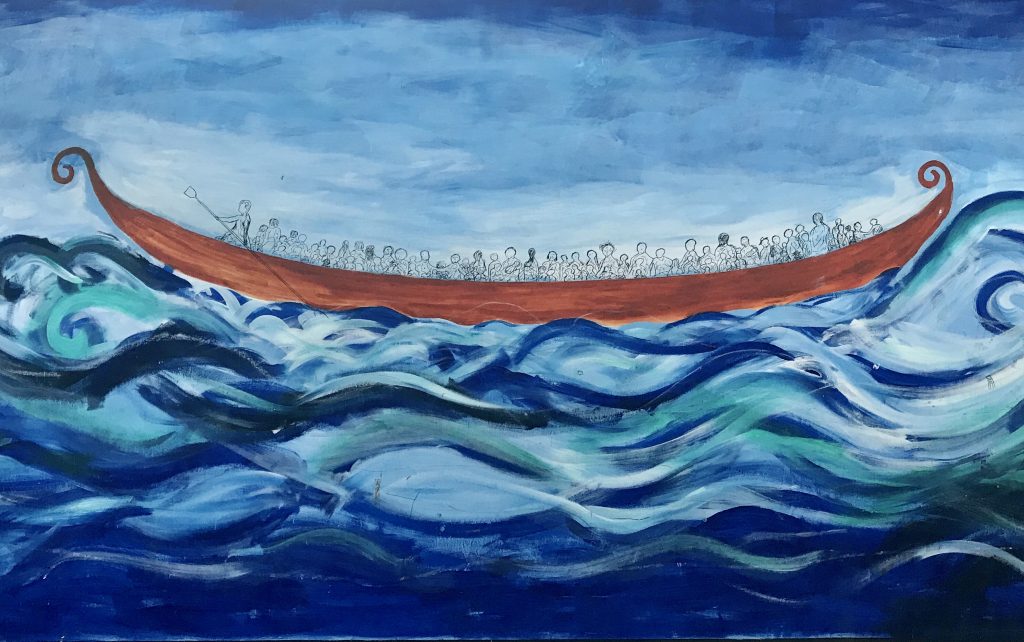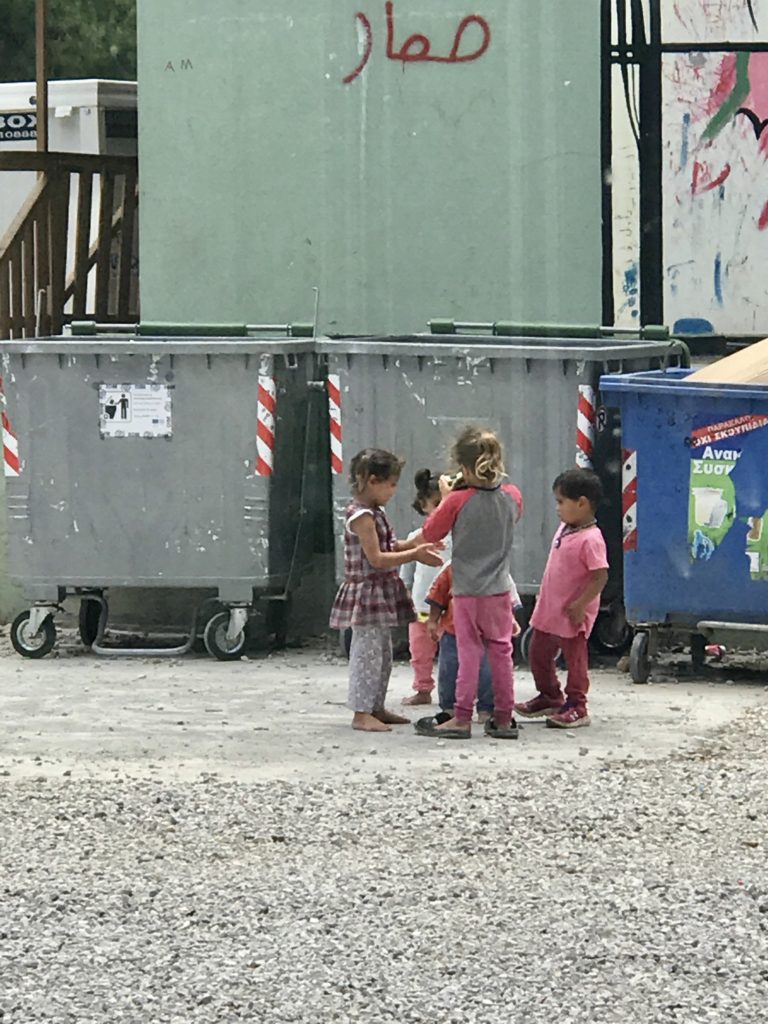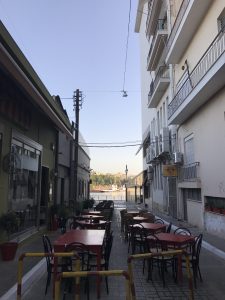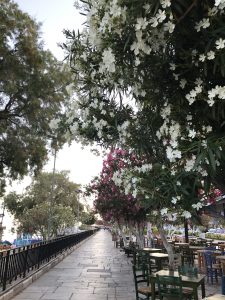Nearly one in 100 people have been pushed out of there homes due to political instability or war.
4.9 million Syrians, half of them children, have fled their country and are now refugees.
Greece has over 62 refugee camps, housing over 62,000 refugees in total. Although the media coverage on this has dwindled, the crisis is far from being over.
This seemed like an appropriate start to my wrap up blog post regarding my time spent volunteering in the refugee camps in Greece. And now for the more personal:
I’ve been home from Greece several days, and the question, “How was it?” is still a struggle for me. No matter how much thought or effort I put into finding the right words, they will never be sufficient. That being said, I’ll start with the easiest… the physical descriptions.
The camp at Oinofyta, where I spent most of my days, was housed in a large warehouse, which had been subdivided into small housing units (or rooms) that line long hallways, all connecting a main center hall. As far as the size of the rooms, I went into a few that had a double mattress on the floor that took up about half of the space. I’m assuming they were all of a similar size, with some of the larger families inhabiting two adjacent rooms. The hallways in front of the rooms were filled with miscellaneous items that wouldn’t fit inside, such as strollers, empty boxes, clothing, stray pieces of furniture, trash and of course a variety of shoes right in front of the door as shoes were never worn inside. In the mornings, I’d see women sweeping out their individual spaces and tidying them up, yet no one seemed to tend to the hallways, which were filthy. Most of the common walls had been painted, some by kids with colorful hearts and words of love and others by more skilled painters with poignant messages of both hope and hopelessness. The living units were numbered, in a somewhat logical order, starting with 1 and ending with 105, although 105 was a room I never found, hard as I tried, when I was doing community outreach for the eye screening. My wanderings up and down the hallways in search of rooms became my way of meeting the residents, who were always quick to help me out in my search (we were told to refer to the refugees as “residents” rather than refugees as it was much more positive). This was when I had some of my most memorable conversations and began to feel less and less like an outsider curiously peeking in. Although the children often couldn’t tell me how old they were (birthdays are not a day that is cerebrated in the Muslim culture) they never hesitated when I asked their room number, and could usually give me the room numbers of everyone with them as well. An outside flight of steps led to a bank of small bunk rooms, each housing 8 to 10, where the single men slept (ages ranging from 16 on up). I spoke with one man after embarrassing myself by waking him and all of his roommates up when I knocked on his door to let them know about the eye screenings and had to ask,
“How late do you guys sleep anyway???
He told me usually until early to mid afternoon. The reason being, they don’t go to bed until 6:00 or 7:00 in the morning because it’s quieter and cooler in the camp at night. There is very little for the men to do, especially the single men, so boredom and depression have become the norm. There are a handful of tents outside of the warehouse that housed the men who did not care to be around the children. Their tents looked pretty basic, like Army issue, but I was told that that was what they preferred. They pretty much kept to themselves.
Ritsona, where I also spent some time doing vision screening, is a camp of approximately 750 residents, who were originally housed in tents but now are all in ISO boxes, or mobile units. They are predominately Syrian and because that they fled a war torn country, they have full refugee status, which allows them to receive help from organizations such as UNICEF or the IRC (International Rescue Committee). Refugees are still coming into both camps and some are leaving to be re-settled in other parts of Europe, although the leaving is happening at a much slower rate.
The children seem to have free run of the camp and at a third of a total population of around 600 at Oinofyta, there are quite a few of them. Even kids who are still in diapers are seen wandering around by themselves, finding whatever they can to entertain themselves with. These kids were so independent and creative, out of necessity, that they could entertain themselves for hours with a piece of string if that was all they could find. On one of my last days at Oinofyta, 3 kids hung out with me and entertained themselves for an hour and a half by taking turns spinning each other around in an office chair. That simple. They were a laughing, sweating, shouting trio of joy who moved back and forth between Farsi and English (the English to include me) with unbelievable ease. Kids are kids are kids, sometime regardless of their past, their present or their very unsure future. I marveled at the simplicity, the imagination and the raw joy that these kids were able to indulge in on their own. No coaching, no supervision, no props necessary.
Having so little also led to a lot the kids “stealing,” which I’m putting in quotes to soften the word a bit. While I realize that stealing what is not yours is in no way excusable, I can certainly understand where their motivation comes from. Notepads, pens, sunglasses, water bottles and anything else that wasn’t nailed down was at risk of walking out of our space. It became a bit of a game for the kids and often they’d return the item shortly after it had walked out of the door, usually with a coy smile and a hug. The kids gave up everything they had to make the dangerous journey and that need to recoup belongings was ever present. While helping some of the volunteers out with a craft project at the summer camp, this really came into play for me. I had cut up bits of paper to be used to decorate signs and had placed them in piles in the center of a work table while waiting for the kids to join in. The first girl to the table immediate scooped up all the paper bits with her outstretched arms and pulled them towards her, carefully covering them to insure no one else would get any. When I told her she needed to share, she looked me straight in the eye and with an intensity that I hardly thought possibly from this tiny, sweet child, shouted, “NO SHARE!!!” And she meant it with every bit of her 3 feet of being. We solved the problem without tears or tantrums, and as frustrating as incidents like that were, they were also so easy to understand. Part of me wanted to remove the girl from the craft table, step in with some discipline, tell her to think about what she’s done and all that, and the other part of me wanted to give her more paper bits, my shirt, my shoes and whatever else she wanted. These kids have gone through situations that we can’t even begin to imagine, crossing countries on foot then getting into overly crowded boats to continue the dangerous journeys on water, with many of them having to throw all of their belongings overboard because the boat was sinking with weight. Keeping their entry in mind made frustrations as such seem very trivial.
These kids have no boundaries, no structure (short of the a few hours of school in the morning and afternoon camp sessions the volunteers provided) and very little to play with or occupy their time, yet I rarely heard the whining cries of boredom and “there’s nothing to do…” One of the regulars to the vision screening room was a 2 year-old who the residents called “moosha” or “mouse” in Farsi, which was an appropriate nickname for her as she was tiny and quick. She’d wander in, often with a cucumber or a big piece of fruit in hand that she was munching on, looking for something to do but even more so, looking for attention. My last day there, she wandered over to the computer, picked up the mouse and started pretending it was a telephone. She’d hold it to her ear and say “Hello??? Hello???” then would hand it off to me giggling, and I’d do the same. This went on for quite some time. She spoke Farsi and I don’t, but language wasn’t always necessary to communicate.
Now for the harder part on my “What was it like?” descriptions…
The emotions…
Getting to know some of the faces behind the stories that I had read so much about before hand, of dangerous crossings across countries on foot then across water in overly crowded boats, was humbling to say the least. Conditions in the countries that were fled (in Ritsona, primarily Syria and in Oinofyta, mostly Afghanistan), had to be so horrific that families were willing to put themselves and their family’s lives in incredible danger, only to end up in a psychological and legal state of limbo that has been going on for most for over a year – far longer than any had anticipated. Babies have been born in the camps (27 at Oinofyta to date) who are now walking and talking and are considered stateless – children with no country. Germany, a country that many of the refugees hope to immigrate to, does not automatically grant citizenship to those who were born in the camps, leaving these kids without citizenship to any country. There really was so much heartbreak and frustration that I felt like I became a gatekeeper to a sea of emotions, knowing that there was only so much I could take in for the sake of my own sanity. That process has continued for me, even after settling into my regular routine for the past several days.
These refugees are not statistics or headlines or political fodder, but rather, they are real people. They are the sad and hopeless eyes of the mothers who would hold their baby out to me with pride, wanting to know if I wanted to hold him/her. That was especially hard for me when one woman’s baby was the age of my grandson. They are the fathers, who made a point of proudly showing off their English to me with “hellos and how are you?” in English as I passed them in the hallway. They are the sticky hands of the children who would grab my hand, and walk along side me, always desperate for any attention they could get. They are the families, grasping onto whatever hope they can find while days become weeks, and weeks become months and now over a year has passed and still they wait. I was told by so many that they feel forgotten and unwanted. Those were times I was grateful to not speak their language as I had no words to give in response, whether Arabic, Farsi Urdu or English.
My first night back, I dreamt I was back at Oinofyta, only not as a volunteer, but rather, as a resident. The volunteers I had worked with for the past 2 weeks didn’t recognize me as part of their group, but instead thought I was a resident. I tried to explain to them who I was, but hard as I’d try, I wasn’t able to speak. I was without a voice and felt I had been forgotten. I woke up in a sweat, out of breath, my heart pounding. The same thing happened again on my 2nd night home, only I seemed to be more accepting of not having a voice, and spent much of my dream wandering up and down the hallways, trying to find the room where I belonged. I’m still struggling nightly in my dreams, which is a pattern with me that started the first time I volunteered in Perú, over 10 years ago. It seems to be part of my processing mechanism and although it does not allow for an easy re-entry, it has become a predictable part of my journey. I really don’t know what these refugees are going through on a daily basis emotionally, physically or spiritually, but for one brief moment during my sleeping hours, my psyche seemed to be trying to give me a small taste of what it feels like to feel totally forgotten and unheard. And for these past few nights, if only in my dreams, it has been terrifying.
Since I’ve been home, I feel like I’ve only been present as a physical shell, my emotional system still residing in Greece, not quite ready to join me. This re-entry seems especially difficult for me and maybe that’s the reason why it seems to be taking my heart so long to catch up to my physical body. We are not yet in sync and that’s ok, as this is a process that moves at its own pace, and for that, I’m patient.
It would be easy to paint this whole experience with a large brush of sadness, despair and hopelessness, but that wouldn’t be totally accurate. There was joy… on the faces of the children as several volunteers would make their way down the main hallway, led by a song and a guitar, to indicate that it was time for summer camp, Pied Pipper style. This was the highlight of each and every day at Oinofyta and one that makes me smile just thinking about it. The kids and parents as well, would come out of their rooms, smiling and clapping along with the song. Moments like those helped cushion the underlying pain of feeling forgotten and unwanted that has become so much a part of these people’s lives.
There is an NGO (non-government organization) that is involved in both Ritsona and Oinofyta camps called “I AM YOU.” I was so struck by that name and how appropriate it was. I AM you, and you ARE me and we have to be in this together for the sake of humanity. Another NGO, and the main one at Oinofyta, is called “Do Your Part.” And so I try. I know that what I do is only a drop in the ocean, but if that drop can send ripples out far enough to open up the heart and mind of even one person, than I’ve done something, not near enough, but something.
It will be a long time before I completely process the magnitude of this experience, but for now, as I work through it, those sweet innocent faces of the children and the pained faces of the adults come into focus for me nightly and have claimed a piece of my heart.
